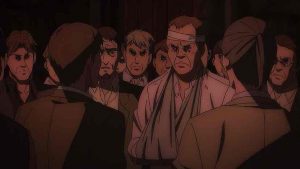 This was certainly the least batshit crazy episode of Attack on Titan in a good while. Not coincidentally, it was also one of the best – I often like these sorts of “micro” rather than “macro” Shingeki eps. While it’s obviously true that Isayama is pretty bad at writing characters, he does have a certain ability to effectively portray the situations characters find themselves in. For me he’s on much firmer ground depicting the impact of war on individuals rather than the sociopolitical reasons behind it.
This was certainly the least batshit crazy episode of Attack on Titan in a good while. Not coincidentally, it was also one of the best – I often like these sorts of “micro” rather than “macro” Shingeki eps. While it’s obviously true that Isayama is pretty bad at writing characters, he does have a certain ability to effectively portray the situations characters find themselves in. For me he’s on much firmer ground depicting the impact of war on individuals rather than the sociopolitical reasons behind it.
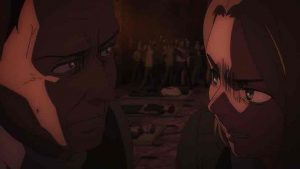 Speaking of characters, I’m heartily pleased to have Annie back. Even if her backstory kinda didn’t make sense (and sounded pretty much like every other Marleyan-Eldian backstory), Annie remains one of the relatively few genuinely interesting characters in Shingeki no Kyoujin. I don’t remember a lot about Hitch to be honest, but she didn’t annoy me as Annie’s verbal sparring partner here. Then fact that Annie was more or less conscious and hearing what others (like Hitch and Armin) were saying in her presence is quite the development, if not entirely unsurprising. I think anybody just waking up from that experience would be a bit crazy to be honest.
Speaking of characters, I’m heartily pleased to have Annie back. Even if her backstory kinda didn’t make sense (and sounded pretty much like every other Marleyan-Eldian backstory), Annie remains one of the relatively few genuinely interesting characters in Shingeki no Kyoujin. I don’t remember a lot about Hitch to be honest, but she didn’t annoy me as Annie’s verbal sparring partner here. Then fact that Annie was more or less conscious and hearing what others (like Hitch and Armin) were saying in her presence is quite the development, if not entirely unsurprising. I think anybody just waking up from that experience would be a bit crazy to be honest.
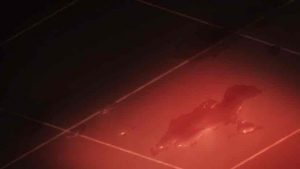 As for Armin, he’s clearly at wit’s end – it’s gotta be exhausting having dumb people rely on you to be the smart one all the time. While Armin comparing himself unfavorably to Erwin made me want to puke, he more or less behaved like himself here. In this situation he falls back on trying to do the decent thing as regards matters he can control, though he rather punts on matters he can’t (which there are a lot of at the moment). Chasing after Conny may be a bit self-indulgent in that it lets Armin abdicate responsibility for grand strategy, but that doesn’t mean it isn’t worthwhile in its own right.
As for Armin, he’s clearly at wit’s end – it’s gotta be exhausting having dumb people rely on you to be the smart one all the time. While Armin comparing himself unfavorably to Erwin made me want to puke, he more or less behaved like himself here. In this situation he falls back on trying to do the decent thing as regards matters he can control, though he rather punts on matters he can’t (which there are a lot of at the moment). Chasing after Conny may be a bit self-indulgent in that it lets Armin abdicate responsibility for grand strategy, but that doesn’t mean it isn’t worthwhile in its own right.
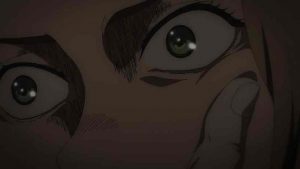 My favorite moment of the episode, in fact, was Mikasa (rather plaintively) asking Armin “What should I do?”. Mikasa certainly isn’t a very complex or interesting character but this was a rare occasion where that was effectively used to generate some pathos. Mikasa has never done a lot of thinking for herself, and she’s pursued more or less one goal single-mindedly for her whole life. Now that’s gone, and she’s totally lost. Armin’s response was effective too – the last thing he feels like doing at the moment is taking responsibility for Mikasa’s life.
My favorite moment of the episode, in fact, was Mikasa (rather plaintively) asking Armin “What should I do?”. Mikasa certainly isn’t a very complex or interesting character but this was a rare occasion where that was effectively used to generate some pathos. Mikasa has never done a lot of thinking for herself, and she’s pursued more or less one goal single-mindedly for her whole life. Now that’s gone, and she’s totally lost. Armin’s response was effective too – the last thing he feels like doing at the moment is taking responsibility for Mikasa’s life.
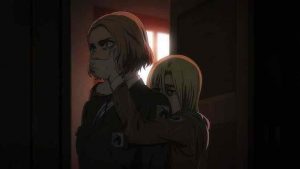 What can anybody do, really? Choose a side, maybe – but there doesn’t seem to be any obvious way to stop Eren’s genocide plan even if that’s the side one chooses. Political power plays seem rather petty in light of that, but that doesn’t mean the country won’t still rip itself out given its new power vacuum. A vacuum Floch moves to fill – adopting what I’m assuming is a complete bullshit story about being in league with Eren all along. Ideals don’t matter much to this guy – survival and power is his game, and it’s not like Eren is going to turn up and call him a liar anytime soon.
What can anybody do, really? Choose a side, maybe – but there doesn’t seem to be any obvious way to stop Eren’s genocide plan even if that’s the side one chooses. Political power plays seem rather petty in light of that, but that doesn’t mean the country won’t still rip itself out given its new power vacuum. A vacuum Floch moves to fill – adopting what I’m assuming is a complete bullshit story about being in league with Eren all along. Ideals don’t matter much to this guy – survival and power is his game, and it’s not like Eren is going to turn up and call him a liar anytime soon.
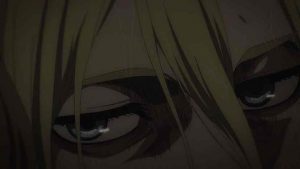 The one fly in the ointment is Levi being still alive, but given that was a mortal lock at least there’s no sense of surprise – just resignation. Like everyone else they’ll have to choose a side too, I suppose – and it’s actually sort of interesting to ponder where they’ll come down on this whole destroying the world thing. Both of them have behaved pretty much like extremists during the entire series, but this is taking extremism to its theoretical extreme.
The one fly in the ointment is Levi being still alive, but given that was a mortal lock at least there’s no sense of surprise – just resignation. Like everyone else they’ll have to choose a side too, I suppose – and it’s actually sort of interesting to ponder where they’ll come down on this whole destroying the world thing. Both of them have behaved pretty much like extremists during the entire series, but this is taking extremism to its theoretical extreme.


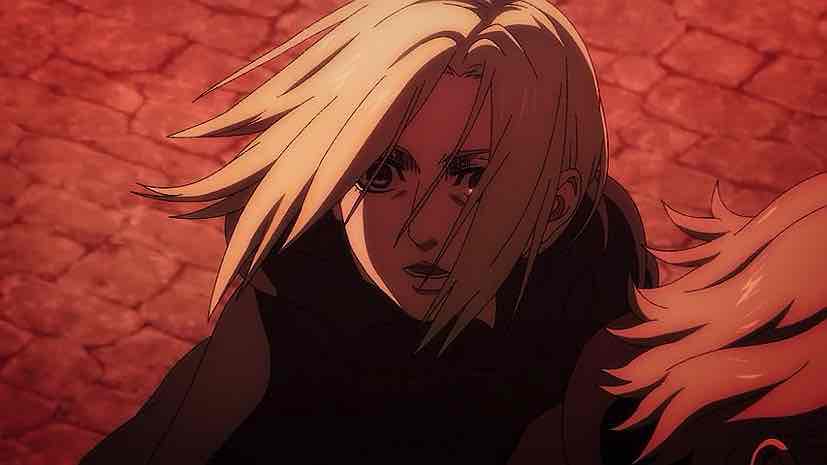
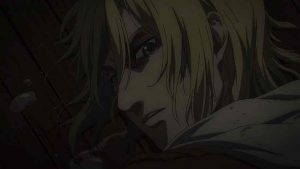
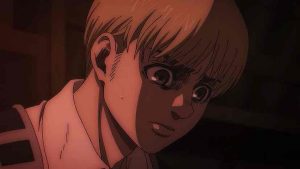
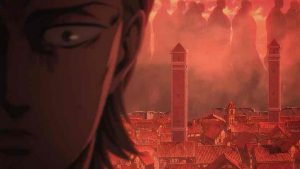
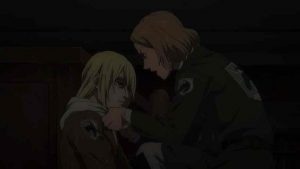
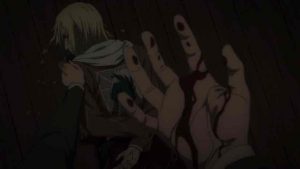
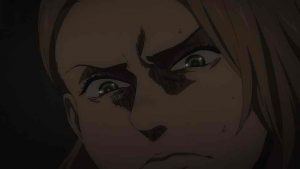
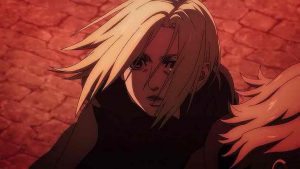
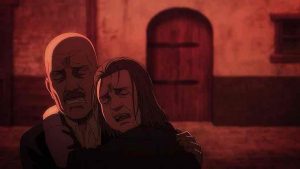
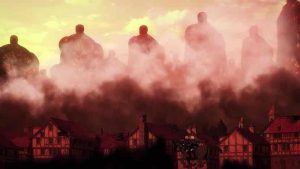

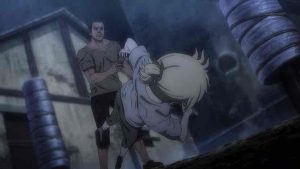
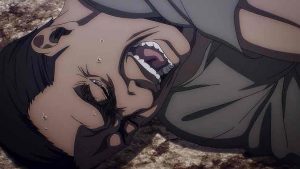
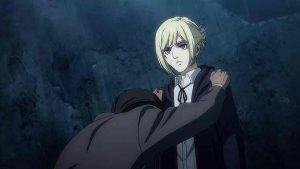
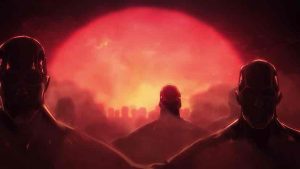
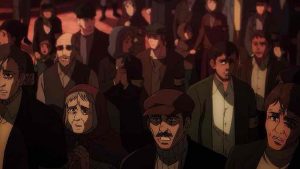
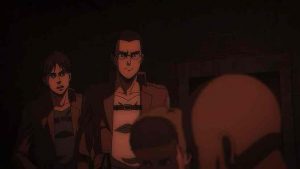
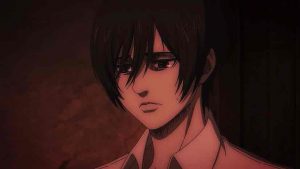
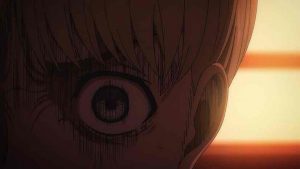
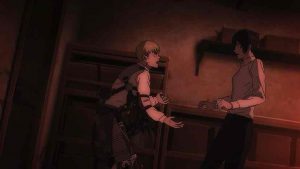
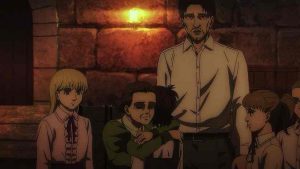
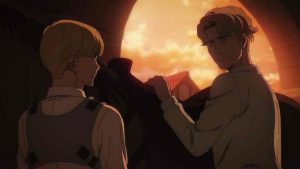
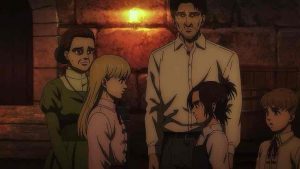
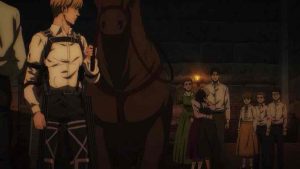
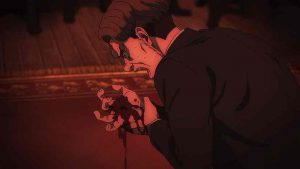
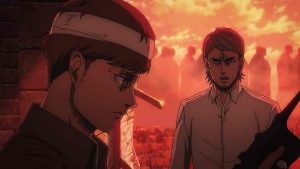
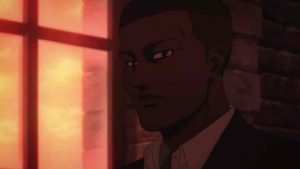
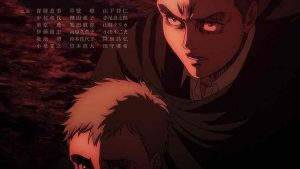
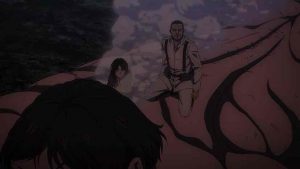
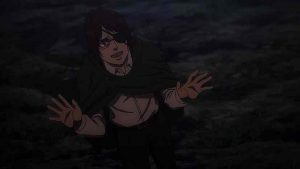
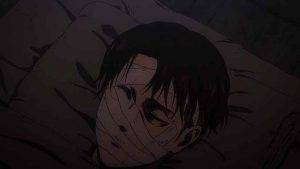
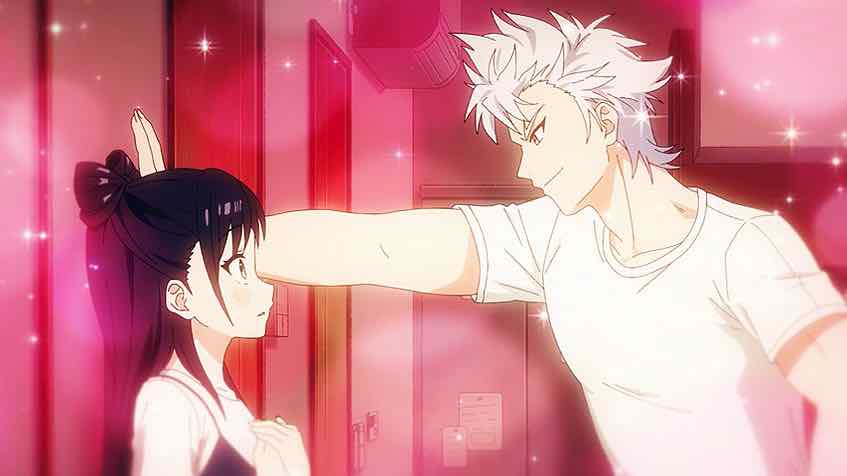
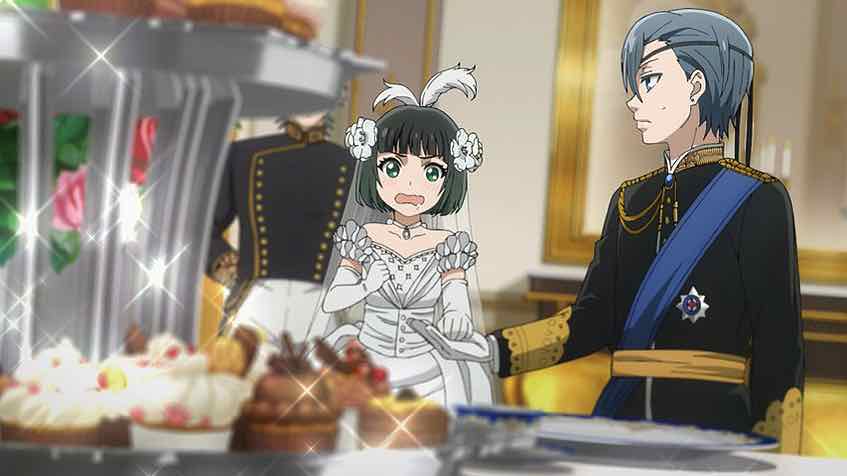
Simone
February 21, 2022 at 9:44 pmEh, Armin isn’t wrong when he says that Erwin wouldn’t have snapped. As in, he wouldn’t have lost his apparent cool, but that was just because he was older and more used to the whole “being a leader who doesn’t show his emotions” thing. Doesn’t mean he would have made any better decisions (in fact I suspect he might have come down on the Eren side of things here… hard to judge for sure honestly, he might as well just have lost all motivation and drive once he achieved his goal of learning the truth). If there’s one thing Erwin was good at, it was bullshitting his way through making his often haphazard and sometimes downright suicidal decisions look competent and well thought out.
Guardian Enzo
February 21, 2022 at 9:56 pmYes, but that’s not all Armin said. He also said “They should have saved Erwin instead of me”, which is really what I was talking about.
It’s clear than Isayama actually believes Erwin was a great leader, and none of that was meant ironically. Which as much as anything can encapsulates just how whack his worldview can be at times.
Simone
February 21, 2022 at 11:00 pmI mean, isn’t Armin also exactly the kind of person who would totally have survivor’s guilt? I don’t think his statements can be disentangled from who he is as a character. He would absolutely say that, whether you agree with him or not.
About Erwin, I think that’s mostly a very common sort of writing problem. I think his character was not supposed to be squeaky clean, as seen from his final speech after the suicidal charge at Shiganshina, but rather, he was meant to be seen as a ruthless genius who only cared about the goals over the means, but was at least very good at achieving those goals. That he doesn’t really come off as that is IMO a typical curse involved in writing such characters: the writers themselves aren’t as smart as the characters they’re trying to portray, and in particular, aren’t nearly as experienced in the topics the characters are supposed to be hypercompetent in (in this case, military strategy and tactics), not to mention the complexities of actually porting that expertise to a world with fundamentally different rules of war and technology. So they end up making up some bozo who does some really basic or sometimes straight up stupid shit and have a Greek chorus of characters comment just how SMART and GREAT they are. It’s a problem seen all over – even in shows like Legend of the Galactic Heroes (which is a lot better at this IMO but still borrows tactics from historical Napoleonic battles when they really wouldn’t apply in space any more), not to mention stuff like Code Geass which gets downright silly with it. Hell, even good old Dragon Ball Z would often just have people comment about how flawless the technique or how smart the strategy someone used was, when virtually all of the time it only boiled down to “big power level beats smaller power level”.
Goh
February 22, 2022 at 5:43 amThe non-dupes errent as Lacan said and we see it here again with the midwit commentariat believing themselves to be above Erwin and erring on such a fundamental level as to make themselves alienated from humanity. If you want to understand what Erwin represents to people it would do you good to shut down your already contaminated and unconvincing ideological pose for a few minutes and go browse any youtube video with Erwin in it. See how people, teenageres, naturally respond to him. And it is the correct response of course. Getting bogged down in all this garbage about the strategic validity of his tactics etc. is a missing the forest of the trees equivalent of debating power levels. Try to *feel* his presence, what he means in the story and beyond it. Reconcile yourself with this figure and it would go a long way towards a larger reconciliation with human beings, our history and our spirit.
Simone
February 22, 2022 at 7:38 amDude, calm down. It’s obvious that Erwin is supposed to represent a charismatic and inspiring leader, we aren’t stupid, but in the real world, if you’re charismatic and inspiring but only lead people to doom you aren’t much use as a general. The greatest generals in history (people like Julius Caesar, Napoleon, Garibaldi) were both able to inspire loyalty AND actually excellent tacticians. This is purely a matter of suspension of disbelief. If someone is said by everyone to be a genius tactician, you expect to see genius tactics from them.
Guardian Enzo
February 22, 2022 at 7:50 amYes, good point about the trap that these sorts of characters represent for weak writers.
Erwin is a rare trifecta – venal and incompetent, plus in a position of power.
Simone
February 22, 2022 at 7:47 pmThere’s also another adaptational issue. Erwin’s first real big role was the scouting mission back in season 1, and just like Trost, that was dragged to hell and back, to the point that it felt like more scouts were slaughtered by Annie than had departed from the walls in the first place. The fact that it felt all so slow and ridiculously over the top really made it feel like Erwin was being a complete dummy, unable to react or do anything meaningful (not to mention that it was his idea of a “trap” to lure out the enemy in the first place…). While it still wasn’t exactly a great operation, a more concise telling might have make it feel more like I think it was supposed to be – a surprise strike that caught everyone unaware and ended before any effective response could be mounted.
But really, the tactical problems go beyond just Erwin. They’re built into the setting, kind of like with zombie movies. The simple fact that pure titans go inactive at night should be enough to make it straight up unbelievable that smart humans with this level of weaponry would ever lose or be entrapped by them. Everyone needs to be a bit dumbed down in order for the setting to even work. Granted, now it’s been addressed that technology would indeed eventually catch up to titans and make them obsolete, but as far as the pure titans go, that should have happened long ago already (shifters, who are faster, bigger, stronger and driven by intelligence are another matter).
sonicsenryaku
February 22, 2022 at 11:18 pmWhat would you say is the main reason you consider Isayama bad at writing characters?
Guardian Enzo
February 22, 2022 at 11:43 pmBecause almost all the characters in his series are bad.
LimsKragma
February 23, 2022 at 1:46 amThey seem to be kind of… underdeveloped? There are some developments suggested at the beginnings, when they are introduced, and along the story it seems to me as if they become a plot device. So the plot moves, but the characters do not grow along with it. And while it is easy to sympathise with the situations they are put in, it is as if the characters stay flat and do not grow past them
Simone
February 23, 2022 at 6:22 amTBF Mikasa is objectively one of the most boring co-leads in a shonen anime in recent memory. Possibly rivalled only by Nezuko, a girl who literally doesn’t speak a word (not that being mute is an obstacle to being a great character: see our little prince Bojji…).
I wouldn’t be so negative as to say that all his characters are bad, but they certainly aren’t the focus. Perhaps Gabi might actually be one of my favourites, for all that she’s so hated by the fandom (also Falco, both are good).
Guardian Enzo
February 23, 2022 at 9:25 amYes, Mikasa is a staggeringly sterile and boring “protagonist”. It’s not hate like it is with Erwin or Levi but she’s just so bland. A very typical Isayama character.
I hated Gabi with a passion at first. But credit where it’s due, she has at least exhibited that rarest of all Shingeki traits – character development. She’s actually figured a few things out and changed her views. She’s also stopped that hideous non-stop screaming. I’m still not a fan but at least she’s grown, and with Isayama that makes her stand out.
Simone
February 24, 2022 at 1:26 amI mean, as a *person*, Gabi starts out terrible, but that’s what makes her an interesting character for me. She showcases the example of someone who fully and enthusiastically bought into the propaganda of the regime she grew in (in contrast with Falco who is shown to be a lot more doubtful about the bullshit they have forced down their throat).
Overall, I’m not as negative as you towards AoT characters in general, but certainly wouldn’t call them the strongest aspect of the show. Of the main trio, Armin is the only interesting one. I suppose you could read Eren as a commentary on how psychotic the standard dark shonen protagonist mindset can actually be if forced into a more realistic sort of conflict, but pre-time skip, he’s really pretty dull, and post time skip, the main interesting thing about him is that he’s turned vilain. He serves a function but has hardly any great depths – being very single minded is what defines him. As for the rest, some of the most interesting ones are probably the original team of shifters, Reiner first. Ymir (the lesbian Scout one) and Historia too, but the first one’s been nommed very early on, the second’s on maternity leave, so they’re out of the equation at this point.
Guardian Enzo
February 24, 2022 at 7:49 amJean’s not bad.
sonicsenryaku
February 25, 2022 at 11:10 amI was a fan of Gabi ever since the Marley arc; but that’s because it was clear to me what Isayama had planned for her so I was never onboard the hate train there. I find one’s ability to properly assess a story and make constructive critiques on it to be based on their ability to refrain from reacting on impulse and to be able to moderate the mind’s tendency to project, as that can lead to the basest of human errors and logical fallacies. I’m with Simone on this one: I certainly wouldn’t be as negative as to call almost all the characters in attack on titan bad as I think that opinion lacks the nuance necessary to describe what Isayama actually struggles at when it comes to character writing . If we’re going by the definition of what bad character writing is, a good amount of the cast in this series don’t fit that bill. A writer struggling with aspects of character doesn’t mean they entirely suck at it. Isayama’s weakness in writing characters comes down to one big thing: that too often he paints his characters’ personalities, cognition, and behaviors in broad strokes. For the most part, Isayama is able to write characters with clear motivations along with behaviors and thoughts consistent with said motivations. Most of his cast of characters act with agency even if they are grappling with flaws (which are clearly articulated with action rather than blatant exposition), and each of them have a conflict that is also logically consistent with the character traits he writes them with (plenty of this can be supported by and tested by the very events that have occurred in the show). But most importantly, Isayama demonstrates effective use of the rules of cause and effect when it comes to characters, elucidating the actions each character commits and how said actions drive the plot. The fact that Isayama is able to do this with a good amount of the important cast members is actually pretty effective, whether or not you grow to like the characters. Your characters don’t have to necessarily be likable to be well-written; they just need to be understood, follow the proper rules of cause and effect, and be logically consistent with past experiences illustrated to the audience. The issue then that often times rears its head when Isayama writes his characters, is that they’re written with little variance in their cognition, behaviors, personality traits, and actions, so they tend to feel redundant in their presentation at times. Great character writing takes into account that people are defined by more than just two cognitive thought processes and one response to those streams of thoughts; and so while Isayama has been able to write some interesting characters like Reiner, Zeke, and Armin (who is my favorite), too often do you see those broad strokes in his other characters. So while he can write entertaining cast members like Sasha, they also feel limited in their expression because their character aren’t presented with enough variance to feel that there’s more to them beyond one or two traits.
All that being said, I think Isayama puts a lot of thought in how he writes his cast of characters. you have to agree with his mindset (whatever that may be) but after scouring the web last week for interviews on his thought process when writing AoT, I’ve learned just how surprisingly thoughtful he is when constructing a scene or how he envisions a character. From his thoughts on the relationship between Erwin and Levi, to his thoughts on the moment when Eren, Armin, and Mikasa make it to the ocean, to his thoughts on the trio’s friendship; there’s a passion from this man and a plan behind his writing to generate pathos through the characters’ journey. It’s funny because as I was reading these interviews last week, plenty of what he said confirmed a lot of the things I’ve been saying about the characters and how he intended to write them throughout our discussions on this series. This continues to support my notion that if you take empirical evidence from the story and constructively apply it, it can give you an insanely accurate read on the author’s intent.
I also looked around to see if I could find anything that indicated Isayama has some disdain for Armin; and I even went back to watch season 1 and 2 with your interpretation in mind……..and nope; I couldn’t see it. Isayama seems to talk respectfully about Armin and how he crafted his purpose in the story when speaking in interviews. The whole “referring to Armin as a female” was a deadpan joke on Isayama’s part that was taken extremely out of context by articles writing on the topic and had nothing to do with disrespecting Armin himself. Anyway, in the series itself, all of Armin’s plans are effective and are praised. Even as Armin tries to take the path of understanding rather than the path of violence, he is rewarded for his tenacity in sticking to his values, even if there are times he has to compromise them or if they are moments that his compassion is challenged. The whole debate regarding whether Erwin or Armin should be saved was an exercise in championing Armin’s values and the idea that his intelligence and compassion would be the key to helping humanity survive. Throughout this story, Isayama has been repeating the idea that war and hate breeds more war and hate, and that at some point, we gotta find our way out the forest. Armin is part of the answer to this question Isayama continues to ponder: how do we get out of the forest. Like Simone said, had Erwin still been alive, he might have been okay with leaving Eren alone to massacre the world, rationalizing it the way Jean does in last weeks episode (although Jean does this because he’s at his wits end and just wants to ensure his friends stay alive), but Armin won’t. It’s probably going to be Armin who puts his foot down and says: “Yea, we gotta stop Eren; we can’t let him do this.” Once again, it’s going to be Armin and Mikasa who have to be responsible for reeling Eren in, the same way they always have throughout their childhood, which is obviously the intentional parallel, just this time its on a much larger scale